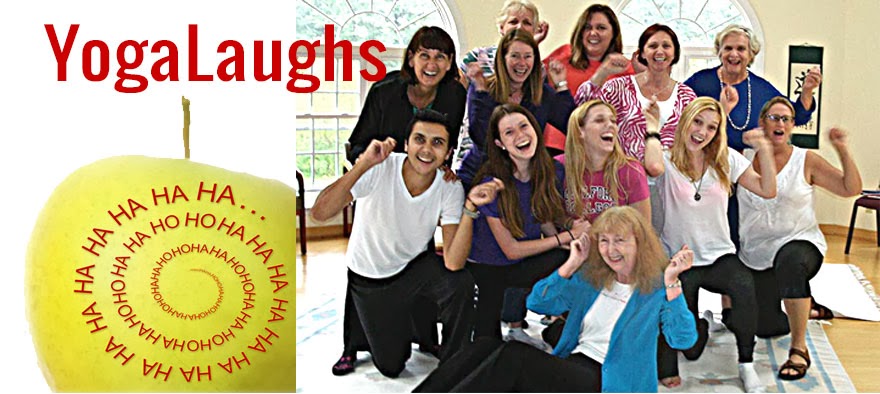Laughter as Meditation: A Pointer to Transcendence
By Leigh Meredith, Certified Laughter Yoga Teacher. Published: ECHO Monthly, 2011.
Before her trip to Manhattan, a friend studied maps of Manhattan extensively, planning her day trips and walking tours. She “knew all about” Manhattan. Then, she called me from her trip while walking the streets of Manhattan. She enthusiastically talked about “experiencing” everything (what wasn't on the map.) The quicker pace of living, smells in the air, the loud traffic and the way you almost can't see the sky between the tall buildings. Just because she had studied the map didn't mean she knew what it was to actually be in Manhattan. She knew the pointer - the instrument that would help her find her way once she got there. But the instrument isn't the experience. Knowing about something isn't the same as realizing it.
We seem to agree, based on scientific studies and ancient teachings, laughter helps us. However, realizing you truly needed that good, hard laugh just shared with a group of friends is different from knowing that research suggests laughter decreases your blood pressure.
Our society welcomes children playfully laughing together, then we graduate to knowing we need to laugh more as adults. Also, if we laugh, we require a good reason. Laughter is the first language we speak as babies and the first language we stress out of our lives as adults. Our experiences of laughter helping us, long-term, can be sparse.
When we share a mutual, uproarious laugh with a group of people, for that moment, everything falls away. All of our feelings of separateness disappear. We automatically step outside of our hard working minds. When we come back from a guffaw, even though our minds can't quite grasp why – we feel more connected to the group and to ourselves.
Could we observe that again? With no effort but to chuckle a bit, we are endued with the following power: To quickly release separation from others and reconnect with them indescribably; to easily step outside of tired thinking patterns and perceptions; and to instantly access who we truly are.
I've read many spiritual books for “seekers” and stuck with a few beliefs and disciplines to help me, well, transcend. I wanted to be here only if I wasn't really here and felt lonely because of not really being here when I was here. That may make sense to a few people.
Laughter is intrinsically transcendent. When we laugh mirthfully, we can't think. It's not that the mind is at rest. It's simply not present. With practice using laughter as meditation, stress loses it's grip on our day-to-day living. The great tyranny is gradually overthrown.
I started laughing as meditation when I adopted the practice of Laughter Yoga. I really needed to laugh to control depression and anxiety. Thankfully, there were no jokes. Please note: Laughter Yoga wasn't “the cure” for me. Wellness needs to encompass all of my habits.
I received training on how to lead Laughter Yoga through Bharata Wingham of Yogaville and from the founder, a medical doctor from India, Dr. Madan Kataria. I've been holding Laughter Yoga club meetings for almost five years in Charlottesville. Laughter Yoga approaches laughter as breathwork and exercise at the beginning of a session. The group's laughter inevitably becomes naturally funny by the end of the session. The many benefits, including transcendence and deep relaxation, are easy to access after laughing for 30-40 minutes.
Julie, a dedicated Laughter Yoga leader, has been coming to laugh with us weekly for over two years to control stress. She says it's preventative medicine. If she doesn't laugh regularly, anxiety and health problems will creep in again. This “preventative medicine” story is common among the group. Nancy, a retired high school teacher, who helped found the club, loves the sensation of being 7 or 8 again and having permission to play. She's also noticed her youthful energy returning.
Spiritual personalities usually want to be transcendent. Instead of a glowing halo experience, in Laughter Yoga, it's hugely practical and comparatively mundane to what I've been told about transcendence. We step aside and let our laughter do the work. Miracles do indeed happen. Which ones? That depends on what you need. Laughter is part of us as well as something we do. It seems to have it's own wisdom.
I need to laugh as discipline to escape my tired thinking and occasional bleak moods. That's not a big deal. Not complicated. Not a new idea. The challenge: Laughter Yoga doesn't make logical sense. It doesn't follow a complex method of thinking my way into not thinking. I can't become an expert laugher. My laughter, the map, the pointer, can't improve and can't get worse.
Practicing Laughter Yoga – going “on location” – frees me to experience the deeper reality of letting go of the mind and receiving emotional healing. I'm spontaneous. It's quiet. I can see the open sky.

No comments:
Post a Comment